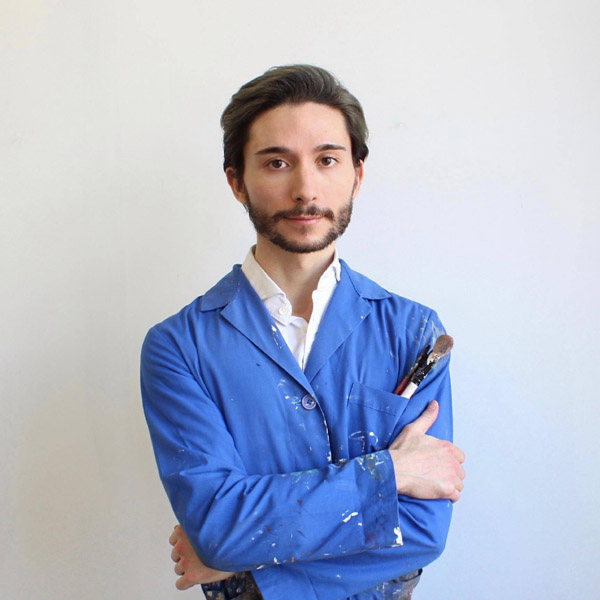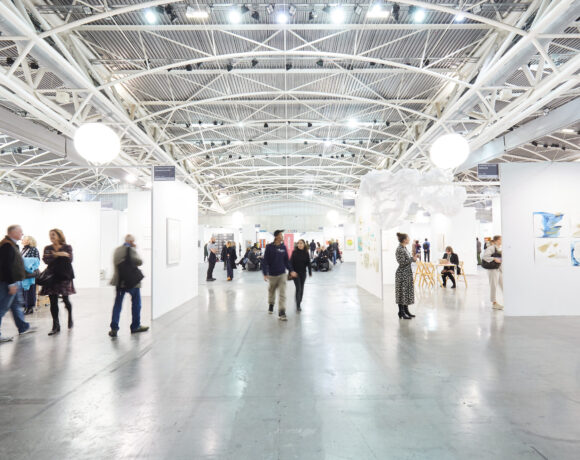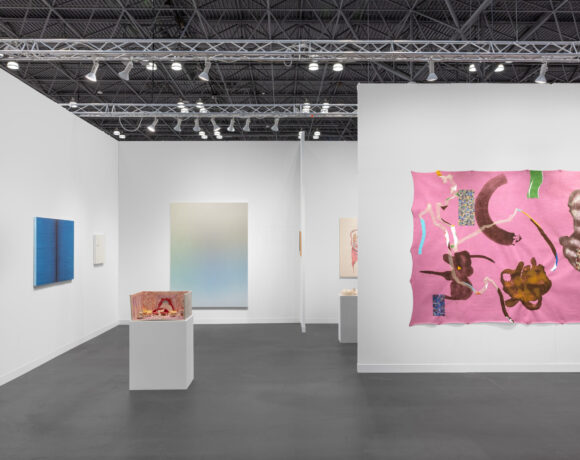The last edition of «documenta» has opened its doors on June 18th, revealing the work of the Indonesian artistic group ruangrupa, at the artistic direction of the quinquennial exhibition that takes place in Kassel, in the heart of the German region of Hessen, since 1955. «documenta» is held in this small town of West Germany, chosen after the Second World War by Arnold Bode, a painter, architect, designer and curator from the same city. Bode initiated the exhibition with the aim of providing an objective account of the art world of his time, rehabilitate the artists who were persecuted, labelled as ‘degenerate’, and banned by the Third Reich, as well as symbolically foster and revitalise the artistic and intellectual production in post-war Germany. At its fifteenth edition, «documenta» has more exhibition venues and a staggering bigger number of artists than the past years. The artists were chosen by ruangrupa, undoubtedly the most relevant change of this year’s exhibition. ruangrupa is the first team that is more artistic than curatorial, after a long list of curators – from Harald Szeemann to Catherine David, from Okwui Enwezor to Carolyn Christof-Bakargiev, to name a few – who succeeded one another at the direction of the exhibition.
The main focus of the ruangrupa team, founded in Jakarta in 2000 and composed of ten members, is the involvement of the public through workshops and collaborative projects, inspired amongst other aspects by rural Indonesian society. Their way of working, based on horizontal decision making and resource sharing, is summarised with an Indonesian word, lumbung, which is a communal rice barn, in rural Indonesia, dedicated to the amount of rice in excess, owned de facto by the entire local community. Such word runs through this year’s whole exhibition captions and press releases as an artistic rather than curatorial statement, while becoming a metaphor for a reconsideration of the very fundamentals of society: from democracy to welfare, from cooperation to resource management.
The artistic teams invited by ruangrupa are fourteen, composed of multiple voices and different professionals, who have invited in turn other participants. Overall, the exhibiting artists are over a thousand. «This is not fully controllable», has declared a gruanrupa member, Farid Rakun, in an interview. «That’s fine, we don’t want to control». A choice in contrast with the vertical management and strict protocol of «documenta», challenged as well by the pandemic, which has imposed more zoom calls, and made visa requests more difficult to obtain. The result is an arts festival far way more crowded than every other «documenta», where most names of the artists disappear under the name of each collective. There is also a bigger number of exhibiting spaces: along with the Fridericianum, the documenta Halle, Hessenland hotel and Ottoneum museum, there are more unconventional locations: a boathouse, a church, a bridge, a dismantled swimming pool, amongst others. The red thread that links the whole show remains, overall, the socially invested aspect of most projects, with workshops and panel discussions that involve visitors of all ages and other activities reflecting upon microeconomy and bioagriculture, gender and decolonisation issues, touching questions of politics and civil rights.
At the Fridericianum museum, one the first exhibition venues of «documenta», there is a strong presence of archives – like the «Archives de luttes de femmes en Algérie», «the Black Archives», and «Asia Art Archive» (AAA), amongst others – and artists and activists that work in turmoiled and unstable geopolitical contexts. Except for names of established artists, such as Jimmie Durham – with an exhibition that pays homage to his legacy – Hito Steyerl, Tania Bruguera, or Richard Bell, the choral aspect of the exhibition, which is closer to a festival than a planned exhibition, aims at shedding light on, and to make visitors reflect upon, queer subjectivities – with Fehras Publishing Practices, FAFSWAG, Serigrafistas queer, amongst others – as well as about processes of decolonisation, political struggles, and fights for minorities and workers’ rights.
From Taring Padi, an Indonesian collective that made a large installation in a dismantled swimming pool, at Hallenbad Ost; to Subversive Film, that highlights vintage films about Palestinian history, at the Gloria Kino cinema; as well as the poetic show at Grimmwelt, a museum dedicated to the Brother Grimm, by Agus Nur Amal PMTOH, an artist that keeps a Javanese form of storytelling alive, who will lead workshops with some local schools from Kassel. This year we see few paintings, as well as few sculptures, but several artistic forms that are more narrative: from comics – with comic artist Nino Bulling – to graphic novels – Fehras Publishing Practices – where gender non-conforming artists reread the past, like the Cold War era, through the lens of queer subjectivities. Video installations seem uncountable: from Sada, based in Baghdad, a group of artists that narrates the dramatic everyday violence in Iraq; to ikkibawiKrrr, a Korean collective that poetically portrays nature, Korean arts and culture, and post-industrial ruins; as well as videos that tells stories from Palestine, New Zealand, Lebanon, Turkey. Amongst the most impressive installations, worth mentioning are the projects by The Instituto de Artivismo Hannah Arendt, started by Tania Bruguera, with a strong satire about the repression against artists in Cuba, at documenta Halle. At the same exhibition venue, Baang Noorg Collaborative arts and Culture has designed a skatepark, and a shadow-puppet theatre. At the Ottoneum museum, the video installation from INLAND, in conversation with Hito Steyerl, reflects upon nature, agriculture, and figurative representation of the animal kingdom.
If Carolyn Christov-Bakargiev in 2012, and more decisively Adam Szymczyk in 2017, artistic directors of the last two «documenta» editions, have already started an actual delocalisation of the exhibition, between Kassel and other countries, ruangrupa’s «documenta» has overcome the national boundaries too, as well as European borders. A part of the funding for the exhibition has reached the countries where the invited collectives operate, which will finance several ongoing projects before, during and after the 100 days of «documenta». The result, overall, is a quinquennial exhibition that is globalist as well as nativist, offering space for, and visibility to, the ‘wretched of the Earth’, to quote political philosopher Frantz Fanon, rather than established artists and rising stars of the white cube. The almost total disappearance of individual authorship from most projects, except for few cases, overshadowed by the arts collective as a new/old form of social action and production of meaning, is another sign of a radical break from the past, on two sides. On one front, the clear departure from Western curatorial canons; on the other, the break from the cult of individual authorship itself, and the questioning of the very meaning of creating artistic value. Both aspects point directly at the very ontological issue of what art actually is. The results, and the power of «documenta» to shape the art world and its system, are yet to be seen, within and beyond the duration of the event. It remains in fact to imagine how this year’s edition will influence, on the short term, two important key aspects of how the artworld functions: how the art market will respond to this year’s edition, on one side, and which directors will be chosen to curate the next biennales around the world, on the other. Whether we want it or not, ruangrupa’s edition is radical also for another reason: the actual methodology of an art making that is more prosaic, less aestheticized, than we are used to see and experience. While leaving Kassel, eventually, those who are still unsure about whether art will save the world or not, will have to think twice.
Elio Ticca
Info:
documenta fifteen
18/06/2022 – 25/09/2022
Kassel, Germany
 Agus Nur Amal PMTOH, Grimmwelt
Agus Nur Amal PMTOH, Grimmwelt
 Archives de luttes des femmes en Algerie, Fridericianum
Archives de luttes des femmes en Algerie, Fridericianum
 Baang Noorg Collaborative Arts, documenta Halle
Baang Noorg Collaborative Arts, documenta Halle
 Dan Perjovschi, Fridericianum
Dan Perjovschi, Fridericianum
 Fehras Publishing Practices, Hafenstrasse
Fehras Publishing Practices, Hafenstrasse

Elio Ticca (Nuoro, Italy, 1988) is a visual artist and author. Graduated in visual arts and history of art, is a freelance contributor of Juliet Art Magazine, and other publications. He lives and works in Brussels.






NO COMMENT